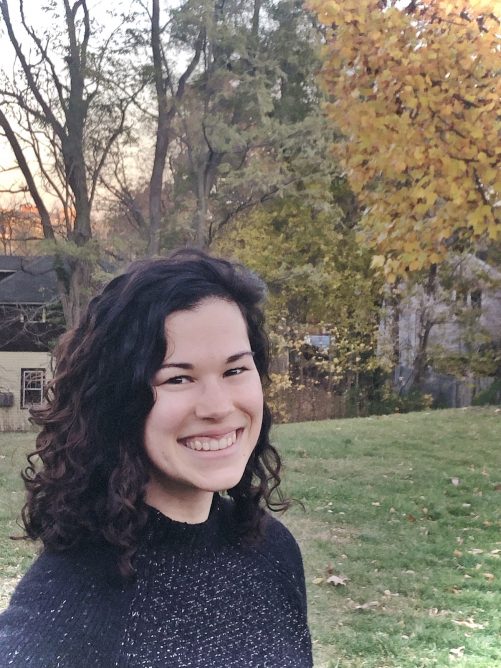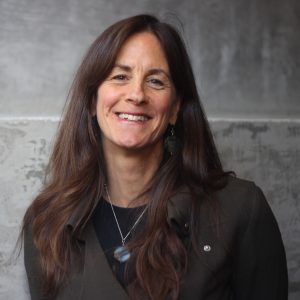Each month, the MA in Sustainable Design program invites a special guest for our Town Hall series where students, faculty, and alumni get to meet and chat with a leader in the field of sustainability or sustainable design.
This month’s guest was Meredith Reisfield, Senior Sustainability Consultant at Quantis International.
Tell us about what you do.
I’m a senior consultant at Quantis, which is a global sustainability consulting firm of just shy of 200 people. It’s been around for about 15 years. We’ve got a big presence in the US and in the EU. In the US we have an office in Portland and Boston, and then a bunch of people who are scattered to the four winds and work remotely — myself included.
One example of what we do is when we help companies that want to make specific sustainability claims about a particular product and need certain assessments to back those up. A number of Fortune 500 companies we work with have never done anything with sustainability and now want to have a best-in-class program. We can help with that, too.
I lead our branch development and client relations. That means that I play match-maker between the different clients and partners that we work with, and the skill sets and capabilities of our team. I really love how nicely it connects some of the purposes of your program, in particular some of the systems thinking work that Denise and I have been talking about.
How did you become a sustainability consultant?
I definitely did not start my career and sustainability. I did my undergraduate degree in a combination of political science, environmental science, and economics. I had a passion for sustainability, but really wasn’t finding a satisfying first career step in that direction. So I actually started my career in management consulting, in finance and financial services. There were parts of it that I loved and parts that they hated, but I realized a couple of things about myself. One is that I really like having a problem in front of me that I didn’t know how to solve. The other is that I really like working as a team.
While I was in grad school I did a large amount of freelance work with organizations like the World Wildlife Fund and the Environmental Law and Policy Center. Then I joined a sustainability consulting team that was getting started and spent several years there working with them to help grow their client base. I joined Quantis in the fall of 2019 and since then have been along for the ride as they continue to grow and raise their level of ambition.
What did you do during your graduate program that helped set you up for the work you’re doing now?
I did a mix of different kinds of client-facing experiences. Sometimes it was a hybrid between a freelance gig and an independent study. Sometimes it was an internship that then turned into a contract.
What I found to be a consistent thread through all of that is when you’re working on something part-time while in graduate school, and it’s in the area hoping to pursue after your degree, you’re in a really unique environment. You have a safety net of individuals who are part of your program, alumni of the program, or teaching there, who have really deep roots into the areas that you might want to be working.
I’ve always felt like being in the student chapter of your life, no matter what age or kind of school, allows you to ask someone for help and have them see a version of themselves when they were also a student. They are more willing to talk through a particular challenge or a topic or need with you. I could contact someone and say, “I’m in this graduate program and I’m plotting my next move and trying to figure out where I go from here. Could I shadow you for a day? Could I talk with you about this program?” This let me take some big steps forward, especially in areas that were beyond my comfort level.
How do you go about finding a company that aligns with what you’d really like to do?
Give yourself space to step back and think about what you consistently like or dislike over your career. Inevitably you’ll find that a couple trends become apparent. I personally like having a really high churn on the number of different things that I work on. I get a lot of satisfaction out of checking things off my to-do list, being able to switch tasks, and having things that are constantly new to me. In contrast, one of my close friends is on the opposite end of the spectrum. She prefers to go super deep on one key topic using a specific set of skills.
There are a couple big dimensions like this in terms of the type of work that you gravitate toward — whether you enjoy being on a larger or smaller team, whether you enjoy having a really similar viewpoints on how a business should be run or how a problem should be approached, or whether you enjoy being challenged and serving a role where you are challenging other people. I was able to have a mentor who asked me a lot of those questions as I was just out of school. I think you’ll find that there are a lot of different kinds of organizations that will fit your list of personal qualities.
I was really drawn towards working in the private sector, rather than in policy and advocacy. I wanted to work with a company where I could be with my tribe. I didn’t want to be the lone voice at the table. There are other people who can do that really well, but I’d done that and it really wore me down. That meant I was looking for companies built around a certain kind of mission and vision, or who had grown to be big enough where I could find smaller tribes within the larger organization.
So many organizations are starting to imbue sustainability into their way of doing business and continue to innovate and do some really cool and unique stuff that didn’t exist 5 years ago. I think if you know what you enjoy doing and the places you enjoy doing it, it’ll give you a natural list of where to look.
I’d also like to point out that we’re at a moment in the industry where a lot of the people who inspired me to pursue this career are now starting to retire. Many of these people were the first people to have their role, so we only have that one example to look at. We’re at a point where the collective group at the table is consistently broadening. There are so many different kinds of skills that are needed across the larger landscape of what needs to happen in sustainability.
What unique qualities do you believe designers bring to sustainability?
I love what you’ve been saying about the squishiness of design and how broadly you define that term. I started my career in economics, and one of my ‘rabbit hole’ topics was behavioral economics and choice architecture, and how you can drive meaningful behavioral change through a system thinking approach.
When I think about the design and sustainability, it’s really about how a specific thing comes to life, whether it’s a product package system or a piece of communication. It needs to happen in a way that matches with your intent, and brings thoughtfulness, systems thinking, and an empathetic lens that ensures you reach that outcome through the choices you make. I think it can be difficult because there are so many different ways that I can play out, but it’s also really exciting. There’s a lot of potential for innovation when designers bring really well-thought-out approaches to their choices.
How should our students present themselves and their skills to companies that don’t have enough awareness to ask for what they bring?
I found that finding the first sustainability-focused position is challenging, but then finding the second one is much easier. There is an enormous amount of interest for people to work on these kinds of issues, but the number of people with experience in certain fields or topics usually pales in comparison to the demand. And the industry has continued to grow every year.
I think you should take a first position in the sustainability-related field that plays into some of your core needs that we were talking about earlier — check what makes you happy — but that also plays to at least a couple of your core strengths. You can always build and grow from there.
It’s all very fluid but I think that the trend is really strong for folks who are already doing the work of building their experience and their knowledge of the space.
Do you see positions for people that are more introverted?
Yes. I work with a lot of introverts. I am ridiculously extroverted and so my role is like keeping a bunch of plates spinning with different partnerships and relationships. That really suits my inherently chatty nature, but a lot of folks just operate on a different frequency. One of my co-workers really enjoys cultivating a small handful of really deep relationships and being able to go really deep on specific topics. She’s carved out a role for herself where her job is to lead a team of analysts who work across our branches, and to build up their skill sets and their abilities. When she is in a client-facing spot, it’s typically to present the results of something specific they’re working on. It’s a very different kind of conversation and dynamic than coming into a really explorative or tentative kind of environment, which is where my career shines.
I think understanding those nuances about yourself will give you a good guide post of where you’re going to be comfortably stretched, and stretched in a way that feels invigorating to you versus, perhaps, stretching in a way that feels wearing or stressful.
I see a lot of introverted folks on the Qantis team who are in those team-building roles and in the design-focused roles. They kind of hang out and jam out in their space. They save their energy for being the face of a project for when they’re at their highest comfort level, or where it’s the most meaningful to them to put themselves out there in that way.
Do you have final words of advice for us?
Trying to understand the professional sustainability landscape can be very difficult because of how quickly things change. I would just double underline that being a student is like a secret magical power. You have a better ability now to access special attention than at any other point in your career. I would encourage you to make the most of that. I also suggest that you take time to look around and find people who you think are doing interesting work. Be willing to reach out to these interesting people and ask them lots of questions. There’s such interesting work out there and it’s really the only way to figure out what your options are.
Thank you Meredith!

